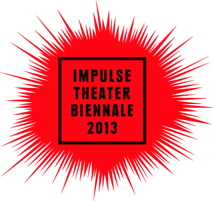
IMPULSE THEATER BIENNIAL
For more than twenty years now, Impulse has been showing the most important independent theater productions in the German-speaking world, constantly redefining itself – much like the scene itself – in the process. For “independent” not only means that the works shown are produced outside the state theater system, but above all, that they develop aesthetic alternatives and continually seek out new approaches and challenges. Artists such as Rimini Protokoll or René Pollesch were introduced to a wider audience for the first time at Impulse.
Over the last few years, the independent theater scene has become part of a very international network and an extensive discourse within art. Impulse – as perhaps the most significant platform and at the same time the most powerful lobbyist for this scene in the German-speaking world – challenges the independent performative arts to use their principle freedom, the freedom of the theater as a medium to extend, to test, to strain, and to overstrain. The freedom of starting over from scratch over and over again. The freedom to invent structures, hierarchies, type castings, sequences, and collaborations in the way appropriate to each artistic undertaking – and not the other way around.
For the independent scene provides the impulse for what a theater might look like that is not caught in particular spaces of thinking and staging. It provides the impulse, not simply to accept the boundaries to other genres in the way that the logics of grant applications, markets, and marketing would have it. It provides the impulse to reclaim the theatrical in art, music, literature, film, and theory as theater. It provides the impulse to think differently about theater as art. For it is not the task of the independent scene simply to be the low-cost repertoire of the new blood. It is not any ‘special path,’ as the German-speaking theater and funding structures would suggest. Rather, it is a clear alternative. In its art as in its working structures.
Starting in 2013, the bi-annual festival will be curated by Florian Malzacher (artistic director) and Stefanie Wenner (dramaturgy). An advisory board consisting of people from academia and arts supports the thematic development. Alongside the program of selected visiting productions, an open call will broaden the horizons beyond the beaten path for entirely new concepts, as well as for already existing productions. The festival will also be accompanied by theoretical and socio-political engagement as well as by an online collection of material that will take up the specific questions of the independent theater scene and open them up to further discussion.
Impulse Theater Biennial 2013 is organized by NRW KULTURsekretariat in connection with the cities of Bochum, Düsseldorf, Cologne, and Mülheim an der Ruhr. Additional support comes from the Kunststiftung NRW [Arts Foundation of North Rhine-Westphalia], the Sparkasse KölnBonn, the Kulturministerium NRW, the Academy of the Arts of the World and the Goethe-Institut.






